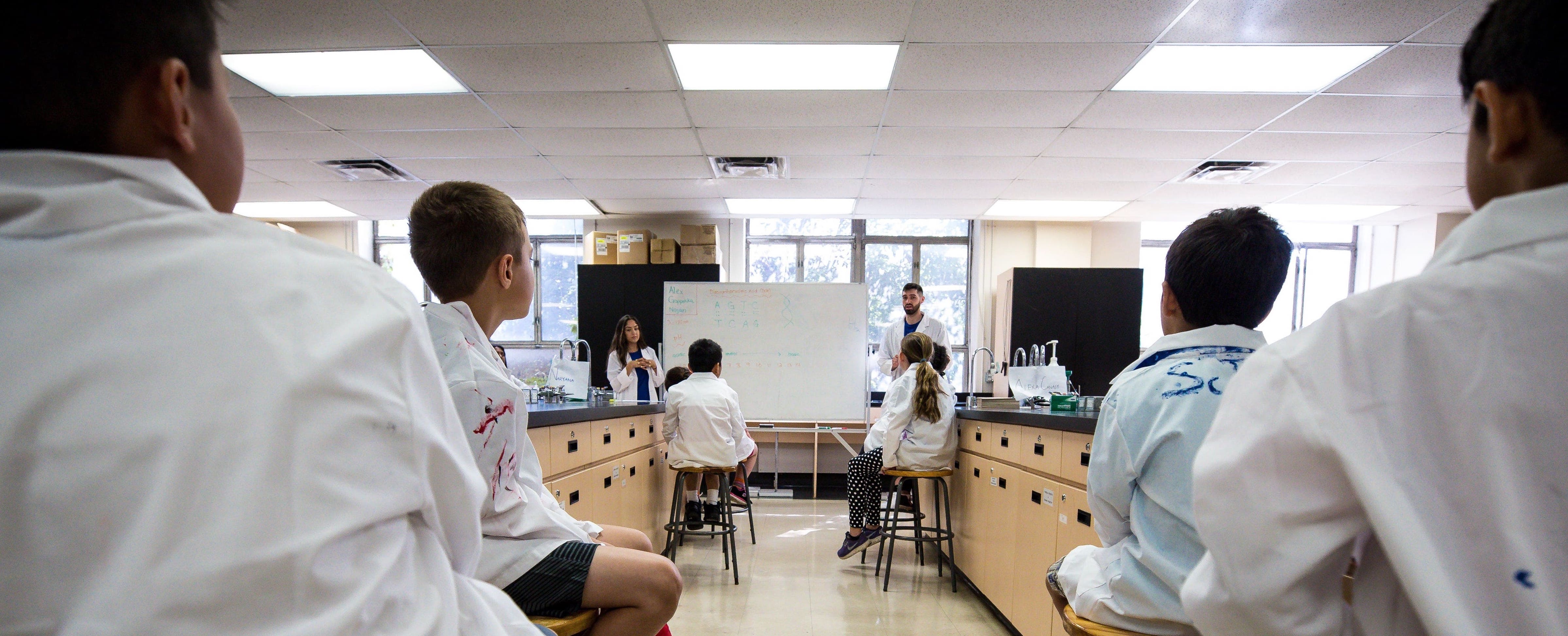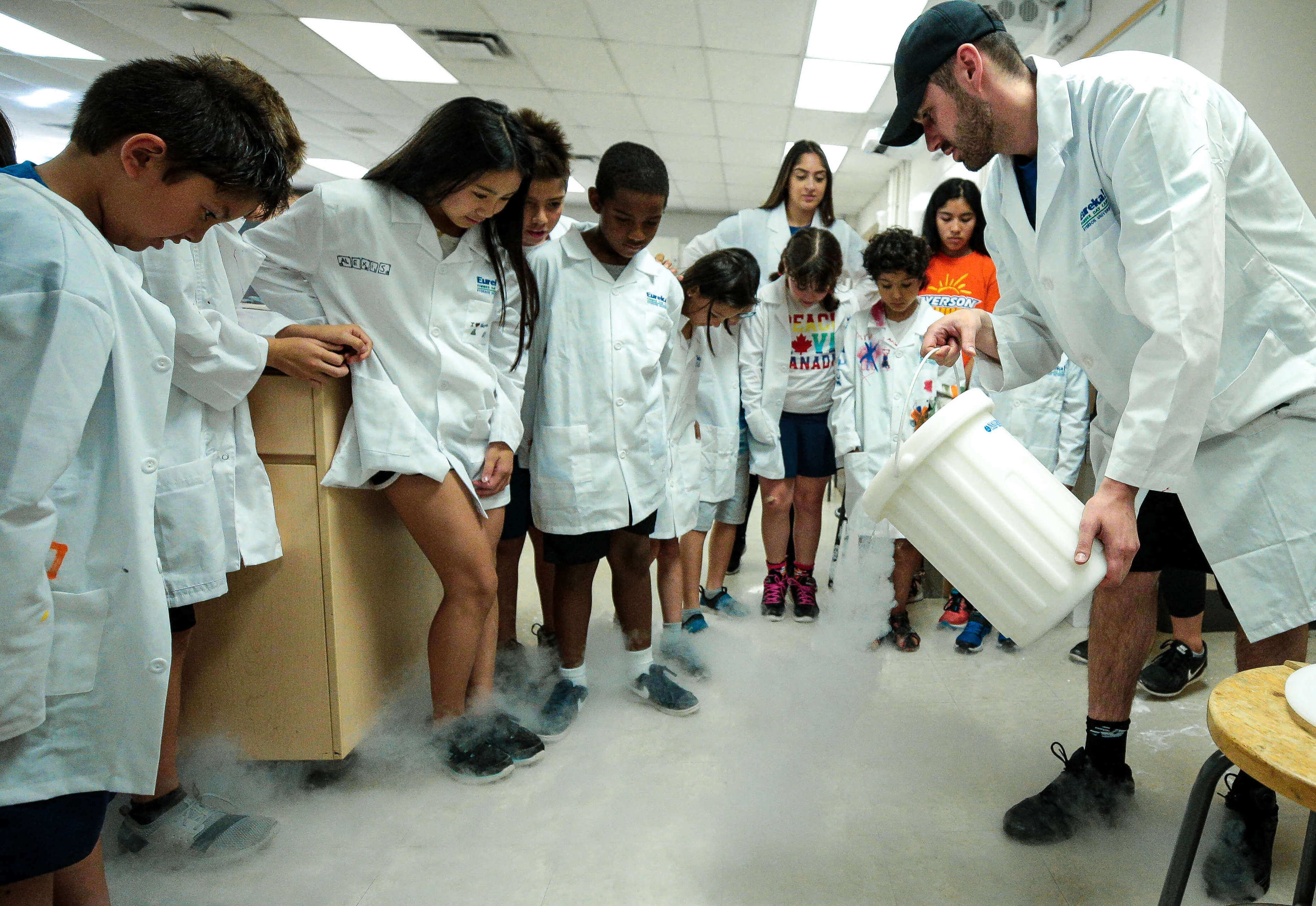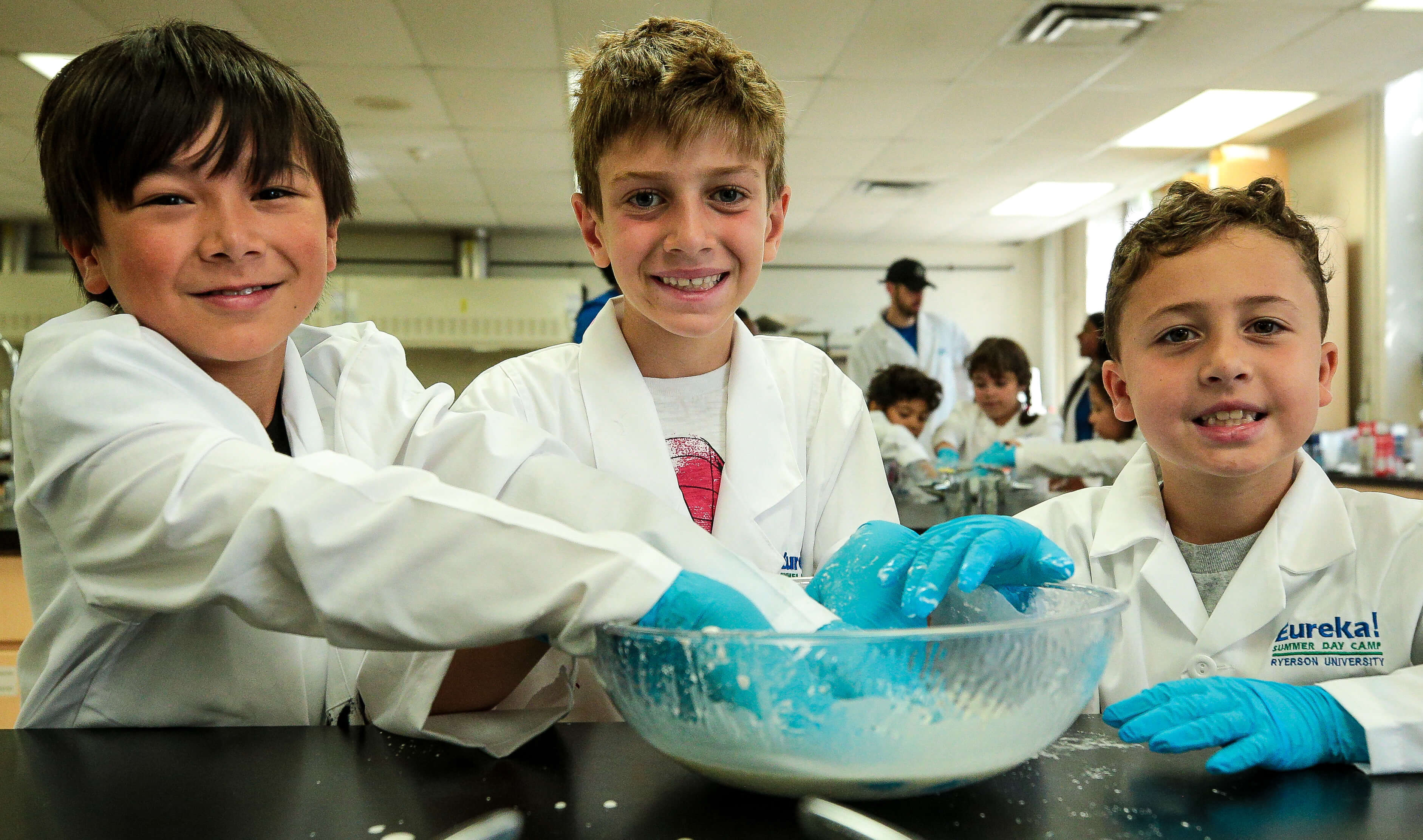Camp Eureka 2019
This July marked the seventh year that the Faculty of Science has collaborated with the Faculty of Engineering and Architectural Science and Ryerson Athletics to develop and run the Eureka Camp! Eureka is a four-week summer camp that is centred around engaging and educational hands-on science and engineering activities. Each day, campers aged 7-13 learnt and applied various science and engineering concepts, that adhered to the designated theme of the week. Then to end off the week, the science and engineering instructors came together and designed a fun-filled day starting with a theme-related collaborative activity and then mini rotational activities that we like to call “Olympiad” in the afternoon!
At Ryerson, we believe in the celebration of excellence. We also believe that it is important to acknowledge and recognize scientists throughout history that have overcome their own unique challenges. To do so, we grouped campers into “houses” that were each represented by a scientist that has faced adversity, or whose contributions were simply not acknowledged. At the start of each week, campers learned some background information about their house representative. We were delighted to see how interested campers were, and how keen they were to learn more about them! Some campers even expressed how the scientists’ background stories would send shivers down their spines! The whole idea behind this was to allow campers to realize that, no matter what their background is, or the challenges that they will have to overcome in their journeys, they are all capable of accomplishing great things!

Eureka House Names
Sarya Naryana Nadella has been working in Microsoft for 22 years and was elected as the company’s new CEO in 2014. His mission is to empower every individual and every organization on the planet to achieve more. Back home in India, he obtained his Bachelor’s degree in electrical engineering, then moved to America where he obtained his Master’s degree in computer science. His goal is to transform Microsoft’s corporate culture into one that values learning and growth.
“The view you adopt for yourself profoundly affects the way you lead your life.”
Ellen Ochoa is an engineer, former astronaut and former director of the Johnson Space Center. She is the first Hispanic woman in the world to go to space, where she served her mission aboard shuttle “Discovery”. Growing up, she played the flute and thought she would go on to receive a Bachelor’s degree in music. However, when she saw that most of her friends were going into science programs, she decided to give it a shot. Luckily, she grew a love for science and went into space where she took on several roles, including being the robotic arm operator. Furthermore, she is an outspoken advocate for minority girls in STEM.
“I tell students the opportunities I had were a result of having a good educational background. Education is what allows you to stand out.”
Alexa Canady was the first American female and the first African American to become a neurosurgeon. She was the chief of neurosurgery at the Children’s Hospital in Michigan, and a professor of neurosurgery at Wayne State University. Growing up, her parents taught her the importance of education, however, her performance in school was always average. One day, a family member measured her intelligence using a standardized test that he was using as part of his psychology research. To her parents’ surprise, she scored extremely high. After thorough investigation, they came to find out that one of her school teachers was swapping her high test grades with that of a Caucasian student who was performing worse than her, just to hide her intelligence.
“The greatest challenge I faced in becoming a neurosurgeon was believing it was possible.”
Robert Satcher is an African American surgeon, chemical engineer and astronaut. He became the first orthopedic surgeon in space and he focuses his research on the health and well-being of astronauts. It has been found that astronauts experience loss of bone density in space, thus, his research is aimed towards trying to prevent that from happening. He is an explorer and he believes that his passion for science and exploration is what got him to accomplish the things he has today.
“Things are out there to be discovered. Some of the things we dream about are now becoming more possible.”
George Washington Carver was an American agricultural scientist, who promoted methods such as growing alternative crops, to prevent soil depletion. It was found that, when cotton is planted repeatedly, the soil begins to deplete by losing its nutrients and key players, such as nitrogen. He urged farmers to grow alternative crops to cotton, with methods geared towards restoring the nitrogen in the soil. In addition to restoring the soil’s nitrogen levels, the alternative crops were healthy for human consumption. Therefore, to promote this alternative agriculture, he widely distributed recipes and encouraged poor farmers to grow alternative crops as a source of their own food and good health.
“Education is the key to unlock the golden door of freedom.”
After last year’s successful integration of weekly themes that broadly incorporated both science and engineering concepts, the weekly themes made an epic return! These themes allowed campers to explore a diverse array of areas within each field, and each theme was applied to science and engineering concepts in its own unique way.
Weekly Themes
The theme for week 1 was “Wonders of the World”. Campers learned and appreciated the many wonders that often go unnoticed in our day-to-day lives. We started the week by learning about light as a wave-particle duality. Campers applied knowledge of the electromagnetic spectrum to visualize the different properties that light can possess at different wavelengths. We ended the week by living a day in the life of a forensic scientist! Campers got to dive into a fictional crime scene, where they were responsible for analyzing DNA samples from multiple suspects in terms of pH and light absorbance, to determine who the culprit of the crime was.
The theme for week 2 was “Destination Earth”. Campers learned about the environment and understanding the processes behind certain environmental dangers. We started the week by doing an owl pellet dissection, which allowed campers to map out food chains and identify the various food sources of owls. Campers continued on the following day to make mini earthquake simulations, which allowed them to visualize the detrimental effects of liquefaction and poor building foundations that result from the colliding of tectonic plates. They ended the week by making acid rain and learning about the causes and effects of carbonic acid in bodies of water. Campers visualized the resulting reaction of carbon dioxide in water, by observing pH colour changes and understanding how this could impact our marine ecosystems.

The theme for week 3 was “I Like to Move it!”. Campers learned about moving systems in our bodies and in our environment that keep us going! We started the week by learning about the circulatory system, and how the heart pumps blood throughout our bodies. Campers used stethoscopes to track the movement of blood, by measuring pulse and heart rates both before and after physical activity. They continued on to experiment with magnets and apply concepts of gravitational force and energy. Campers were able to visualize the different forces that act on an object, as well as understand the theory behind magnetic levitation. We ended the week by observing some cool chemistry, such as exploring phase changes with liquid Nitrogen, and making non-Newtonian fluid – or as campers like to call it, Oobleck! This allowed campers to understand concepts of physical versus chemical changes, as well as their applications and limitations.
The theme for week 4 was “Machines R Us”. Campers learned more about molecular and biological machinery, as well as new and upcoming technological machinery. We started the week by learning about the nervous system and how our brain sends chemical and electrical impulses along axons throughout our bodies. Campers tested out their reflexes, as well as understand which brain lobes were responsible for which tasks by creating “thinking caps”. We continued on to make poop…yes, poop! Campers visualized the digestion of food and the absorption of water and nutrients within the body, that resulted in the formation of poop. They ended the week by learning about renewable energy in terms of its integration in smart cities. Campers learned about the applications of renewable energy and understood how this could advance the innovation and efficiency of our cities.

Successful Summer of Science
Eureka has always been a hit! Campers not only got the chance to work in a real-life university lab as a scientist and problem-solve like engineers, but they also had time to play different sports with their fellow campers. As Eureka camp instructors, we strived to communicate science to our campers and open their eyes to the world of science, while having fun! We knew our job was done when we saw the spark of curiosity in our campers’ eyes or left them thinking about the bigger picture. Through critical thinking and experimenting, we were able to get one step closer to expanding the minds of our future scientists!
